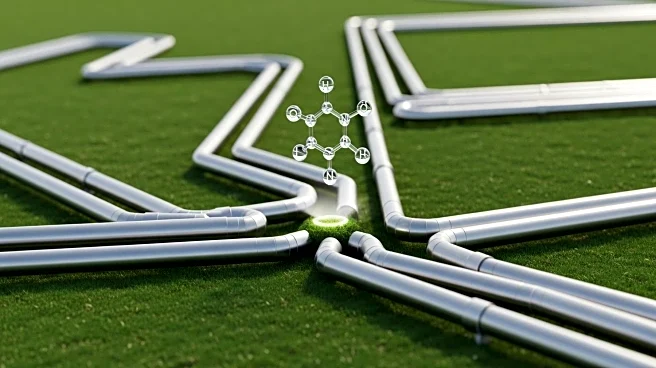What is the story about?
What's Happening?
Nebraska has initiated its first shipments of carbon dioxide through the Tallgrass Trailblazer pipeline, marking a significant shift in ethanol production leadership from Iowa to Nebraska. The pipeline, which was previously used for natural gas, has been converted to transport liquified carbon dioxide from ethanol plants in Nebraska, Colorado, and Wyoming to an underground storage site in Wyoming. This development allows Nebraska's ethanol plants to benefit from federal tax credits for ultra-low carbon ethanol, a market previously dominated by Iowa. Monte Shaw, Executive Director of the Iowa Renewable Fuels Association, acknowledged that Iowa has lost its long-held position as the leading state in ethanol production due to Nebraska's new capabilities.
Why It's Important?
The shift in ethanol production leadership has significant implications for the agricultural economy in Iowa. Ethanol production is a major component of Iowa's economy, contributing billions annually. The ability to access federal tax credits for low-carbon ethanol could add substantial value to Nebraska's ethanol industry, potentially leading to increased demand and higher prices for corn, which is a primary input for ethanol production. This change could impact Iowa's agricultural sector, which is already facing challenges such as high interest rates, input costs, and low market prices. The development may also influence policy decisions regarding carbon sequestration projects and the use of eminent domain for pipeline construction.
What's Next?
Iowa may need to adapt its strategies to remain competitive in the ethanol market. This could involve expanding its own carbon sequestration projects or seeking legislative support to enhance its ethanol production capabilities. The Iowa Legislature is being urged to support energy policies that align with President Trump's leadership to stabilize the state's agricultural economy. Additionally, the Summit Carbon Solutions pipeline in Iowa faces challenges in securing permits for storage and passage through neighboring states, which could affect its ability to compete with Nebraska's new pipeline.
Beyond the Headlines
The development raises ethical and environmental concerns regarding carbon sequestration and the use of eminent domain for pipeline projects. Landowners and environmental groups have expressed opposition to CO2 pipelines, citing potential impacts on property values and safety. The debate over carbon sequestration as a public use continues to be a divisive issue, particularly among GOP lawmakers. The situation highlights the broader challenges of balancing economic growth with environmental sustainability and property rights.















